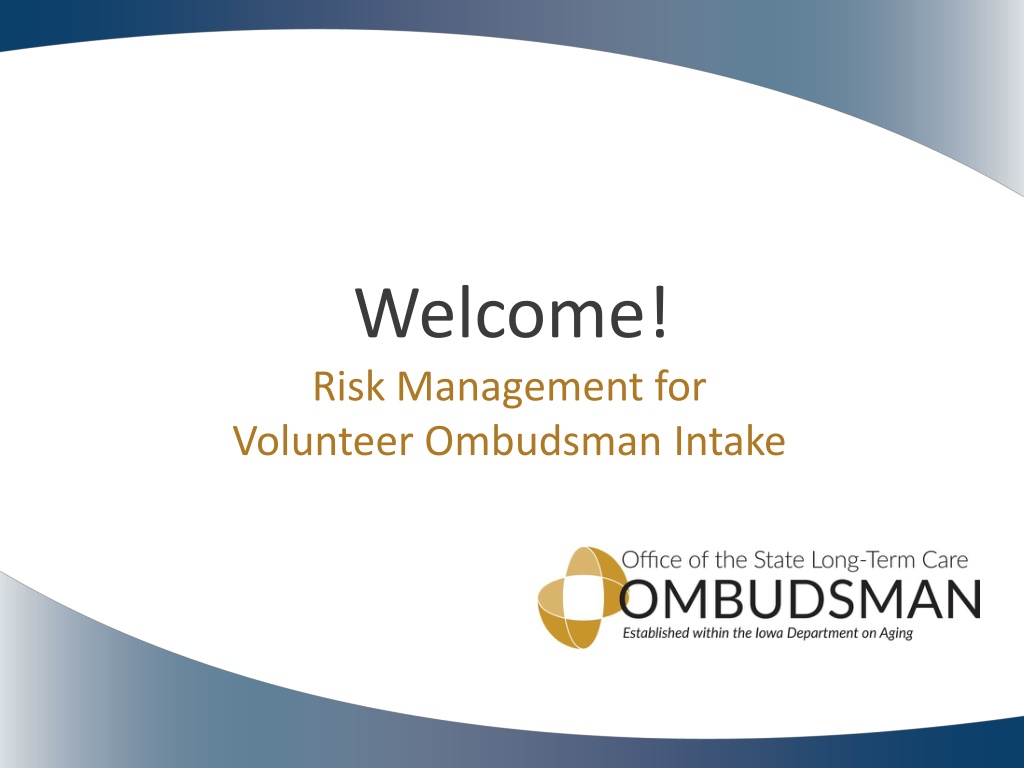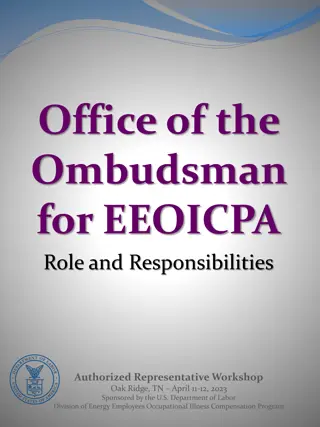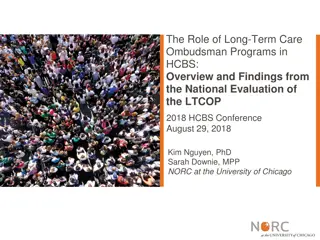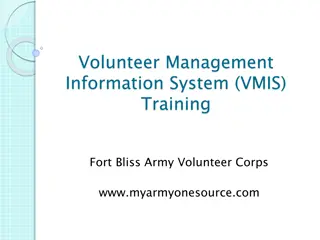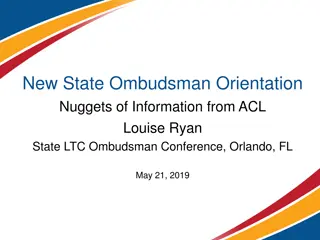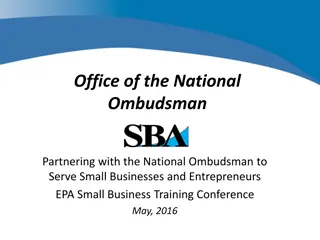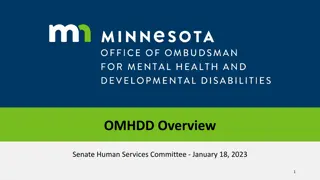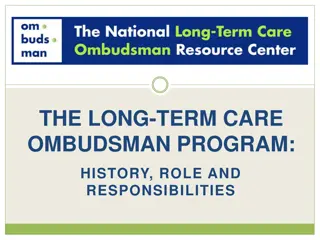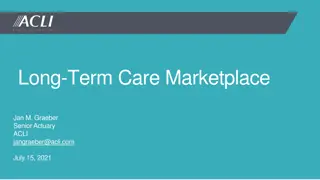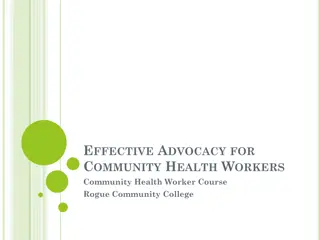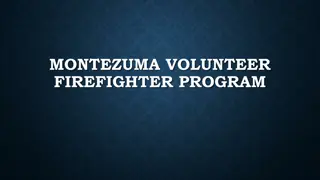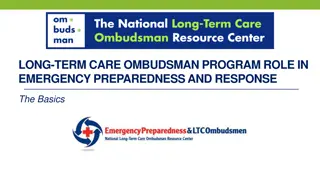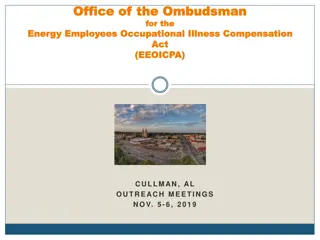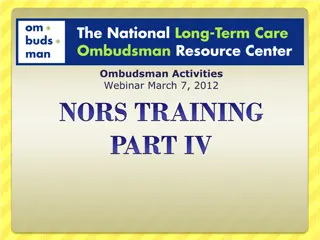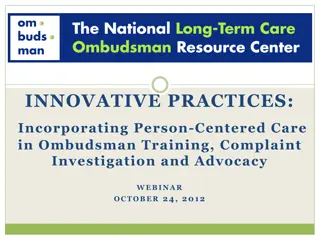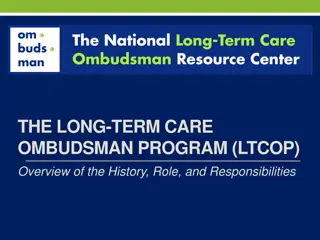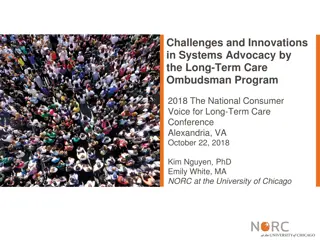Volunteer Ombudsman Program for Risk Management: Empowering Advocacy in Long-Term Care
Iowa's Office of the State Long-Term Care Ombudsman oversees the Volunteer Ombudsman Program (VOP), dedicated to safeguarding the health, safety, welfare, and rights of long-term care residents. The program investigates complaints, seeks resolutions, and advocates for quality of life enhancements. VOP serves nursing facilities and other care settings, with volunteers embodying professionalism, strong ethics, and a commitment to older adults' well-being. Joining VOP requires a compassionate attitude, relevant experience, and a dedication to ethical advocacy practices.
Download Presentation

Please find below an Image/Link to download the presentation.
The content on the website is provided AS IS for your information and personal use only. It may not be sold, licensed, or shared on other websites without obtaining consent from the author. Download presentation by click this link. If you encounter any issues during the download, it is possible that the publisher has removed the file from their server.
E N D
Presentation Transcript
Welcome! Risk Management for Volunteer Ombudsman Intake
Volunteer Ombudsman (VOP) Program Staff Sarah Hinzman Volunteer Ombudsman Program Coordinator Direct: (515) 657-1479; Toll-Free 1-866-236-1430 Sarah.Hinzman2@iowa.gov Cairn Reisch, AmeriCorps VISTA VOP Coordinator Meredith Funke, AmeriCorps VISTA VOP Coordinator
Local Ombudsman Regions Stacia Timmer 712-363-2845 Jennifer Golle 641-420-9850 Kim Weaver 712-541-2641 Melanie Kempf 515-657-1912 Kim Cooper 563-210-7439 Julie Pollock 712-249-7424 Tonya Amos 515-250-7596 Pam Railsback 319-541-0318
Our Mission The mission of Iowa s Office of the State Long-Term Care (LTC) Ombudsman is to protect the HEALTH, SAFETY, WELFARE and RIGHTS of individuals residing in long-term care by investigating complaints, seeking resolutions to problems, and providing advocacy with the goal of enhancing quality of life and care.
Facilities Served Nursing Facility (NF) (SNF) (HNF) Assisted Living Program (ALP) VOP does not currently serve ALP Residential Care Facility (RCF) Elder Group Home (EGH)
VOP Facts VOP is the third edition of previous volunteer programs in the OSLTCO (CRC, RAC) VOP is written into Iowa Code and receives an annual state appropriation First volunteer began in service in September 2013 As of this week, there are 123 VOs serving.
A Successful Volunteer Ombudsman Has a strong appreciation for older adults Professional experience in areas of health, human services, or long-term care Or has some experience as family members or caregivers of a long-term care resident and seek to give back (not get back)
A Successful Volunteer Ombudsman Is responsible and professional Good listener and objective problem solver Able to demonstrate an understanding of program practices throughout interviews and training Do not have a conflict of interest as defined by the Older Americans Act (OAA)
The VOP Certification Process 1. Application 2. Telephone interview 3. Training 4. Individual manual review 5. Follow-up consultation 6. Background check 7. Certification & facility placement 8. Facility orientation with local ombudsman
VOP Orientation 1. Meeting with administrator, Local Ombudsman and certified Volunteer Ombudsman (VO) Volunteer materials distributed Point of contact is established Expectations of all parties are outlined Communication and information sharing practices discussed 2. Tour of the facility 3. Local Ombudsman shadowing
Ongoing VOP Certification For new volunteers, certification is granted for one year Volunteer will complete 10 hours of continuing education during their first year Volunteer will regularly submit monthly reports and visit their facility a minimum of three hours per month Volunteer will abide by all program practices
Ongoing VOP Certification At the time of recertification, the volunteer will be evaluated by the program and the program evaluated by the volunteer Recertification may be granted for a period of two years, with six hours of continuing education required each year
